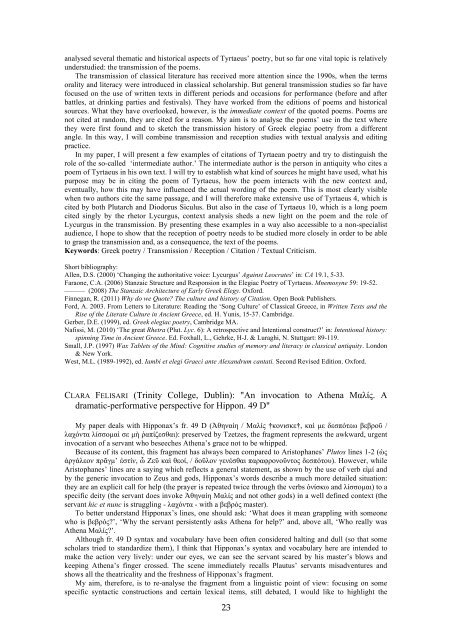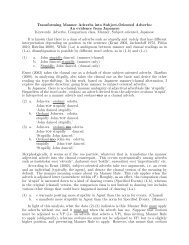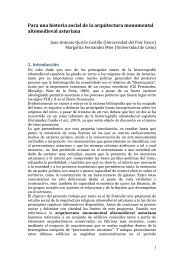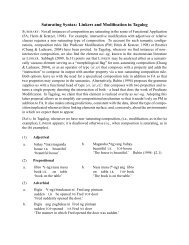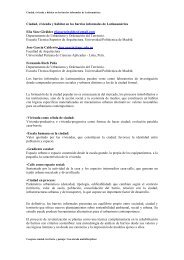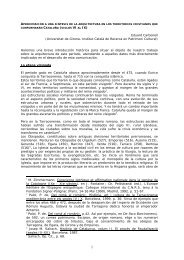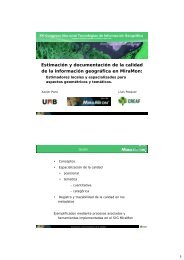Libro de resúmenes / Book of abstracts
Libro de resúmenes / Book of abstracts
Libro de resúmenes / Book of abstracts
You also want an ePaper? Increase the reach of your titles
YUMPU automatically turns print PDFs into web optimized ePapers that Google loves.
analysed several thematic and historical aspects <strong>of</strong> Tyrtaeus’ poetry, but so far one vital topic is relatively<br />
un<strong>de</strong>rstudied: the transmission <strong>of</strong> the poems.<br />
The transmission <strong>of</strong> classical literature has received more attention since the 1990s, when the terms<br />
orality and literacy were introduced in classical scholarship. But general transmission studies so far have<br />
focused on the use <strong>of</strong> written texts in different periods and occasions for performance (before and after<br />
battles, at drinking parties and festivals). They have worked from the editions <strong>of</strong> poems and historical<br />
sources. What they have overlooked, however, is the immediate context <strong>of</strong> the quoted poems. Poems are<br />
not cited at random, they are cited for a reason. My aim is to analyse the poems’ use in the text where<br />
they were first found and to sketch the transmission history <strong>of</strong> Greek elegiac poetry from a different<br />
angle. In this way, I will combine transmission and reception studies with textual analysis and editing<br />
practice.<br />
In my paper, I will present a few examples <strong>of</strong> citations <strong>of</strong> Tyrtaean poetry and try to distinguish the<br />
role <strong>of</strong> the so-called ‘intermediate author.’ The intermediate author is the person in antiquity who cites a<br />
poem <strong>of</strong> Tyrtaeus in his own text. I will try to establish what kind <strong>of</strong> sources he might have used, what his<br />
purpose may be in citing the poem <strong>of</strong> Tyrtaeus, how the poem interacts with the new context and,<br />
eventually, how this may have influenced the actual wording <strong>of</strong> the poem. This is most clearly visible<br />
when two authors cite the same passage, and I will therefore make extensive use <strong>of</strong> Tyrtaeus 4, which is<br />
cited by both Plutarch and Diodorus Siculus. But also in the case <strong>of</strong> Tyrtaeus 10, which is a long poem<br />
cited singly by the rhetor Lycurgus, context analysis sheds a new light on the poem and the role <strong>of</strong><br />
Lycurgus in the transmission. By presenting these examples in a way also accessible to a non-specialist<br />
audience, I hope to show that the reception <strong>of</strong> poetry needs to be studied more closely in or<strong>de</strong>r to be able<br />
to grasp the transmission and, as a consequence, the text <strong>of</strong> the poems.<br />
Keywords: Greek poetry / Transmission / Reception / Citation / Textual Criticism.<br />
Short bibliography:<br />
Allen, D.S. (2000) ‘Changing the authoritative voice: Lycurgus’ Against Leocrates’ in: CA 19.1, 5-33.<br />
Faraone, C.A. (2006) Stanzaic Structure and Responsion in the Elegiac Poetry <strong>of</strong> Tyrtaeus. Mnemosyne 59: 19-52.<br />
——— (2008) The Stanzaic Architecture <strong>of</strong> Early Greek Elegy. Oxford.<br />
Finnegan, R. (2011) Why do we Quote? The culture and history <strong>of</strong> Citation. Open <strong>Book</strong> Publishers.<br />
Ford, A. 2003. From Letters to Literature: Reading the ‘Song Culture’ <strong>of</strong> Classical Greece, in Written Texts and the<br />
Rise <strong>of</strong> the Literate Culture in Ancient Greece, ed. H. Yunis, 15-37. Cambridge.<br />
Gerber, D.E. (1999), ed. Greek elegiac poetry, Cambridge MA.<br />
Nafissi, M. (2010) ‘The great Rhetra (Plut. Lyc. 6): A retrospective and Intentional construct?’ in: Intentional history:<br />
spinning Time in Ancient Greece. Ed. Foxhall, L., Gehrke, H-J. & Luraghi, N. Stuttgart: 89-119.<br />
Small, J.P. (1997) Wax Tablets <strong>of</strong> the Mind: Cognitive studies <strong>of</strong> memory and literacy in classical antiquity. London<br />
& New York.<br />
West, M.L. (1989-1992), ed. Iambi et elegi Graeci ante Alexandrum cantati. Second Revised Edition. Oxford.<br />
CLARA FELISARI (Trinity College, Dublin): "An invocation to Athena Μαλίς. A<br />
dramatic-performative perspective for Hippon. 49 D"<br />
My paper <strong>de</strong>als with Hipponax’s fr. 49 D (Ἀθηναίη / Μαλίς †κονισκε†, καὶ µε δεσπότεω βεβροῦ /<br />
λαχόντα λίσσοµαἰ σε µὴ ῥαπίζεσθαι): preserved by Tzetzes, the fragment represents the awkward, urgent<br />
invocation <strong>of</strong> a servant who beseeches Athena’s grace not to be whipped.<br />
Because <strong>of</strong> its content, this fragment has always been compared to Aristophanes’ Plutos lines 1-2 (ὡς<br />
ἀργάλεον πρᾶγµ’ ἐστίν, ὦ Ζεῦ καὶ θεοί, / δοῦλον γενέσθαι παραφρονοῦντος δεσπότου). However, while<br />
Aristophanes’ lines are a saying which reflects a general statement, as shown by the use <strong>of</strong> verb εἰµί and<br />
by the generic invocation to Zeus and gods, Hipponax’s words <strong>de</strong>scribe a much more <strong>de</strong>tailed situation:<br />
they are an explicit call for help (the prayer is repeated twice through the verbs ὀνίσκω and λίσσοµαι) to a<br />
specific <strong>de</strong>ity (the servant does invoke Ἀθηναίη Μαλίς and not other gods) in a well <strong>de</strong>fined context (the<br />
servant hic et nunc is struggling - λαχόντα - with a βεβρός master).<br />
To better un<strong>de</strong>rstand Hipponax’s lines, one should ask: ʻWhat does it mean grappling with someone<br />
who is βεβρός?ʼ, ʻWhy the servant persistently asks Athena for help?ʼ and, above all, ʻWho really was<br />
Athena Μαλίς?ʼ.<br />
Although fr. 49 D syntax and vocabulary have been <strong>of</strong>ten consi<strong>de</strong>red halting and dull (so that some<br />
scholars tried to standardize them), I think that Hipponax’s syntax and vocabulary here are inten<strong>de</strong>d to<br />
make the action very lively: un<strong>de</strong>r our eyes, we can see the servant scared by his master’s blows and<br />
keeping Athena’s finger crossed. The scene immediately recalls Plautus’ servants misadventures and<br />
shows all the theatricality and the freshness <strong>of</strong> Hipponax’s fragment.<br />
My aim, therefore, is to re-analyse the fragment from a linguistic point <strong>of</strong> view: focusing on some<br />
specific syntactic constructions and certain lexical items, still <strong>de</strong>bated, I would like to highlight the<br />
23


